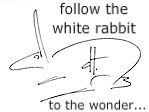"[The miners] were not companions to give the best of help toward progress, and as Curdie grew, he grew at this time faster in body than in mind - with the usual consequence, that he was getting rather stupid - one of the chief signs of which was that he believed less and less in things he had never seen. At the same time I do not think he was ever so stupid as to imagine that this was a sign of superior faculty and strength of mind. Still, he was becoming more and more a miner, and less and less a man of the upper world where the wind blew. On his way to and from the mine he took less and less notice of bees and butterflies, moths and dragonflies, the flowers and the brooks and the clouds. He was gradually changing into a commonplace man.
There is this difference between the growth of some human beings and that of others; in the one case it is a continuous dying, in the other a continuous resurrection. One of the latter sort comes at length to know at once whether a thing is true the moment it comes before him; one of the former class grows more and more afraid of being taken in, so afraid of it that he takes himself in altogether, and comes at length to believe in nothing but his dinner: to be sure of a thing with him is to have it between his teeth.
Curdie was not in a very good way, then, at that time. His father and mother had, it is true, no fault to find with him - and yet - and yet - neither of them was ready to sing when the thought of him came up. There must be something wrong when a mother catches herself sighing over the time when her boy was in petticoats, or a father looks sad when he thinks how he used to carry him on his shoulder. The boy should enclose and keep, as his life, the old child at the heart of him, and never let it go. He must still, to be a right man, be his mother's darling, and more, his father's pride, and more. The child is not meant to die, but to be forever freshborn."
from The Princess & Curdie, 11-13
this site has moved...
-
come and follow the whimsy at it's new home @
*http://webofwhimsy.postach.io/ *
11 years ago























No comments:
Post a Comment